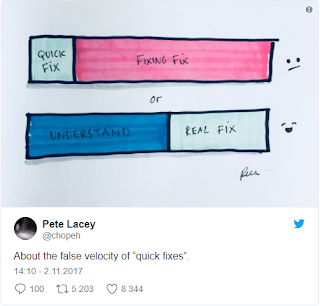software development area - names are almost only context that can be added to a computation. By using common vocabulary we build shared understanding of how things work and what is their meaning. When we communicate with outside world using our language we also put a corner stone under the how eg. business people will be able to visualize system we are responsible for.
One of the greatest examples of metaphor used to explain the nature of projects to stakeholders is a term coined by Ward Cunningham - technical debt. In very illustrative way it mimics well known figure of a financial debt to explain the costs or possible impact that unmaintained software brings to owners.
In the opposite pole I can see a term used so often, while bringing so much confusion and leading to misunderstandings and even conflicts in many organisations. I mean the "quick fix". Quick and dirty, when we tend often to forget how dirty it was, leaving it in our software just to make it rot. Please keep in mind each time you say "quick fix" what you really communicate is "cheap fix". Is it what you meant? Will it be that quick in the final picture? Or it is just half done, ad hoc patch that will not consist solution, but maybe bring counter productive impact to changed process?
Recently I have watched Netflix "Cooked" series of four, visually elaborated stories about food and eating. It was about the real food, that brings value to our life, as opposed to what is often offered to us, mass product of industry, optimized for price only, washed from nearly everything our body needs. The junk food.
I find this being a perfect metaphor to what is often offered as a "quick fix". This word junk explains exactly nature of the fix without giving a false assumption that anything cheap is being discussed. Let's be clear about it.
It is a "junk fix", not "quick fix".


No comments:
Post a Comment